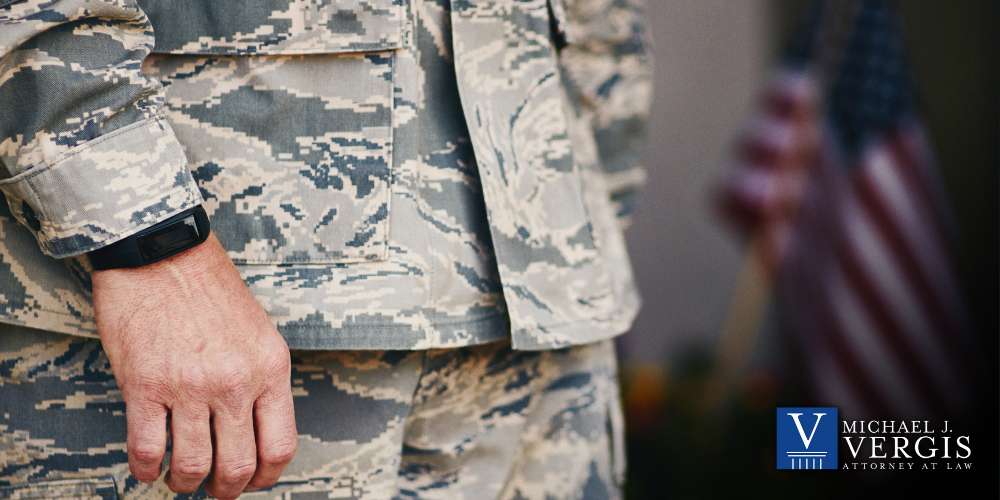MILITARY DIVORCE LAWYER
Home » Family Law » Military Divorce Attorney
Experienced Military Divorce Attorney in Bossier City & Shreveport, LA
It is not uncommon for someone to assume that a military divorce requires a completely different process than a typical divorce, such as how criminal defense matters are handled differently. The truth is, the term “military divorce” simply means when one or both spouses are either on active duty or retired from military service.
As such, a military divorce is not a completely different process than typical divorce proceedings. The divorce still takes place in a civilian court in front of a domestic relations judge, just as would be in any other family law matter. However, though the proceedings are similar in nature, the issues that arise in these proceedings are quite different.
Because there are certain problems that may arise that are specific to military law in divorce proceedings, it can be incredibly important that you have an experienced family law attorney who specializes in military divorce.

Shreveport-Bossier family law attorney Michael J. Vergis is more than qualified to represent military members in Northwest Louisiana with their divorce proceedings. If you are considering filing for a divorce or have been served with divorce papers from your spouse and seek legal representation for the potential challenges to come, contact The Law Office of Michael J. Vergis today to see how he can help.
Call (318) 698-3724 or complete a simple online intake form to get in touch today.
What Makes the Military Divorce Process Different?
Divorces in the military tend to pose some unique problems in comparison to civilian divorce. It still requires heavy litigation and mediation to protect your assets and ensure you receive a fair distribution of property, but the property in question may be different.
For example, perhaps the most obvious matter that makes the military divorce process unique is the issue of military retirement accounts and benefits. The management and distribution of these assets and benefits require different considerations than a typical retirement account might. It is important that the lawyer representing you knows how to address such issues.
Another thing that makes this process unique is the establishment of child custody and visitation rights. It is particularly common for active duty service members to receive orders that station them in another state or even another country. This makes child custody arrangements an especially challenging matter for divorced military families.
Yet another common issue that comes up with military divorce is the issue of knowing where to file the divorce. As a military family, it is likely that the servicemember and his or her spouse have moved around since the beginning of their marriage. However, the state where you were married is irrelevant to your divorce. It is only where you and your spouse choose to file for divorce that will affect your proceedings.
This is because the state court needs to be able to establish jurisdiction over you and your spouse. To do so, three points may be met: military divorce may be filed in a state where 1) the military spouse lives, 2) the military spouse is a resident, and 3) both spouses agree upon the state.

Military Divorce Laws
Some laws that you may need to be familiar with when it comes to military divorce include the Servicemembers Civil Relief Act and The Uniformed Services Former Spouse Protection Act. Of course, there are also several other laws and regulations that come into play when dealing with military divorces, including those under both federal law and state law.
That is why it’s so important that you have an experienced military divorce attorney on your side who fully understands these laws and can help guide you through the legal process, all while protecting your legal rights and advocating for your best interests. Overall, the knowledge and experience a Shreveport divorce lawyer like Michael J. Vergis can offer can lead to more well-informed decisions and successful outcomes.
Servicemembers Civil Relief Act
The Servicemembers Civil Relief Act (SCRA) grants military members a few protections. This includes the postponement or “stay” of civil court and other administrative proceedings, so long as the service member can prove they were unable to attend because of active duty.
It also offers certain protections for things such as failing to respond to a lawsuit or failing to appear at trial, such as for military divorce proceedings.
Uniformed Services Former Spouses Protection Act
The Uniformed Services Former Spouses Protection Act (USFSPA) applies not to the military member but to his or her former spouse. Under the USFSPA, state courts are authorized to treat military retirement pay as marital property, which can be divided during divorce proceedings. This law also allows former spouses to receive a portion of the service member’s retirement pay directly from the Defense Finance and Accounting Service (DFAS) if they meet specific criteria.
Additionally, the USFSPA grants certain benefits to an un-remarried former military spouse, such as medical (TRICARE), commissary, exchange, and theater privileges. However, under the “20/20/20” rule, he or she must first meet certain requirements.

How Long Do You Have to Be Married to Get Military Benefits After Divorce?
To qualify for military benefits after a divorce, including military pensions and other related benefits, the marriage must meet specific duration criteria outlined by the USFSPA. Generally, you must have been married for at least 10 years during which the service member performed at least 10 years of creditable military service. This is known as the “10/10 rule.”
The former spouse may be eligible for other military retirement benefits, such as access to military healthcare and commissary privileges, if they meet further specific requirements, like the “20/20/20 rule” or “20/20/15 rule,” which involves longer durations of marriage and service overlap.
Understanding these rules is crucial for former spouses seeking a share of military retirement benefits post-divorce as well as military members to know what they may be required to share in the event of a divorce.
10/10 Rule
The 10/10 rule in military divorces allows the former spouse to receive a direct payment from the DFAS from the service member’s military disposable retired pay. Military retired pay is the gross retired pay minus certain deductions such as taxes, survivor benefit plan (SBP) premiums, and other authorized deductions. Here are the requirements to meet the 10/10 military rule:
- The couple must have been married for at least 10 years.
- During the marriage, the service member must have completed at least 10 years of creditable military service.
20/20/15 Rule
Under the “20/20/15” rule, former spouses may only be entitled to receive TRICARE medical insurance coverage for one year following the date of the divorce, but only if they satisfy the following requirements:
- The service member has performed 20 or more years of creditable service.
- The marriage lasted 20 or more years.
- The time of marriage overlaps the time of service by at least 15 years.
20/20/20 Rule
The 20/20/20 rule allows for additional benefits, including the full medical benefits and the ability to retain a military ID. The requirements to meet this rule include:
- The former spouse must have been married to the service member for at least 20 years before initiating divorce proceedings.
- The service member has performed 20 or more years of service that is credible in determining retirement pay eligibility.
- The former spouse was married to the service member during 20 or more years of his or her retirement-creditable service.

How To Get a Divorce in the Military
The first step in any given military divorce case is to establish legal residency, which determines where you can file for divorce. Either spouse can file in the state where they have legal residency, where the service member is stationed, or where the couple last resided together.
Once the appropriate jurisdiction is determined, the divorce process begins with filing a divorce decree and obtaining a court order that outlines the terms of the separation, including property division, child custody, and support arrangements.
Property division in a military divorce case can be complex, particularly when it involves military retirement benefits. The divorce decree must specify the portion of the military disposable retired pay awarded to the former spouse. It’s important to note that certain things, like Concurrent Retirement and Disability Pay can affect the amount of disposable retired pay, as this type of VA compensation is not divisible under the USFSPA.
Navigating the following proceedings can be challenging and requires careful consideration of both civilian and military laws. Obtaining legal advice from experienced military divorce attorneys can help ensure that all aspects, including property division, child support, and spousal support, are properly addressed.

How Long Does a Military Divorce Take?
The duration of military divorce cases can vary widely depending on several factors, including the complexity of the individual case, the level of agreement between the spouses, and the specific state laws involved. Generally, a military divorce can take anywhere from a few months to over a year to finalize.
One key factor influencing the timeline is the division of marital property, including military pension payments and other assets. Determining an equitable distribution can be challenging and potentially lengthy, especially when considering military-specific benefits like VA disability compensation, as military disability pay is not subject to division as marital property but can affect overall financial settlements.
Child support and spousal support arrangements also play a significant role in the duration of a military divorce. Negotiating these support terms to ensure they meet state guidelines and adequately address the needs of the children and the non-military spouse can add time to the process.
Other factors such as legal residency, the deployment status of the service member, and any required court orders or legal issues involving property division or custody can further extend the timeline.
Does the Military Help With Divorce?
Military service members and eligible family members may obtain free legal advice through installation legal assistance offices provided by the military. Through these legal assistance services, a service member and his or her spouse may receive separate legal assistance for mediation, advice, and notary services.
However, it’s important to note that military-provided legal assistance cannot represent the clients in court. That is why when dealing with complex family law issues, having a private attorney with knowledge and experience handling military divorce can be incredibly beneficial to your case.

Experienced Divorce Attorney for Military Service Member and Military Spouse
Shreveport-Bossier City family law attorney Michael J. Vergis offers dedicated legal assistance to both military service members and non-military spouses in the Northwest LA region. With his office conveniently located near Barksdale Air Force Base in Bossier City, LA, Attorney Michael Vergis is an easily accessible and reliable advocate for military families in the area.
His experience as a local family law attorney combined with his thorough knowledge of state, military, and federal laws means that he is able to provide fair representation for either party, including the military member and their non-military spouse. (However, it’s important to note that military divorce attorneys cannot represent both spouses at once – only one spouse.)
Whether you need help navigating the division of a spouse’s military pension, negotiating child support obligations, or arranging to receive or pay spousal support, Attorney Vergis is the guy for the job. He and his legal team can provide invaluable guidance to ensure compliance with all applicable laws while protecting your rights.

Call the North Louisiana Military Divorce Lawyers at the Law Offices of Michael J. Vergis Today
At The Law Office of Michael J. Vergis, our Shreveport-Bossier attorneys provide military families with unparalleled service in a competent and caring manner while working diligently to provide the best possible outcome.
To discuss your individual circumstances with an experienced military divorce lawyer in the Shreveport/Bossier City/NWLA area, reach out to our law office right away. Call (318) 698-3724 or complete our online contact form to request a consultation with one of our Louisiana military family law attorneys today.


